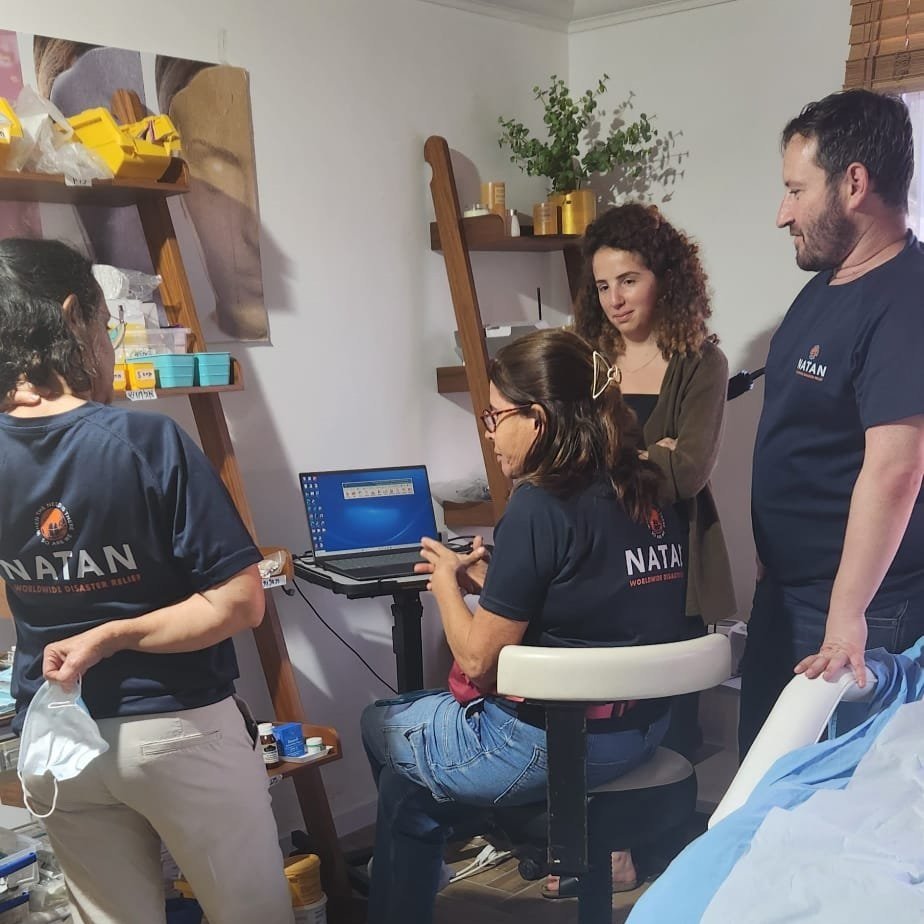Volunteering with survivors: The unyielding capacity to overcome
Arielle Kaim is a PhD candidate studying Emergency and Disaster Management at Tel Aviv University. This month she volunteered at NATAN’s medical and dental clinics for evacuees and survivors of the Oct 7. She tells of how she put academic theory into practice, and what she has learned.
This journey has illuminated that the soul of emergency and disaster management is innately human: marked by vulnerabilities, endowed with strength, and characterized by an unyielding capacity to overcome.
Arielle at NATAN’s dental clinic for evacuees
Amidst a crisis that has tattered society’s intricate weave, the real-world applicability of academic theory undergoes its sternest trial. As a PhD candidate studying Emergency and Disaster Management at Tel Aviv University, I faced this exact challenge with NATAN. A mere month after disaster struck, uprooting lives to the refuge of Dead Sea Hotels, I decided to join forces with NATAN, contributing to their vital mission of humanitarian aid, affirming that home is indeed where the help is now needed most.
In response to the call for volunteers, I assumed the logistical and management role alongside a dedicated volunteer squad at two clinics of —a dental and a medical—under NATAN's benevolent wing. My scholarly endeavors, deeply rooted in the principles of disaster management, medicine, and resilience, were juxtaposed against their tangible, real-life manifestations.
Arielle and the NATAN team at the clinic at the Dead Sea
Service with NATAN unfolded as a series of vibrant case studies, each personal interaction weaving reality into the fabric of my academic insight. The resilience I had studied and researched, in other words—the capacity to not only "bounce back" but "bounce back better" after adversity—was now a vivid testament in the survivors' indomitable spirits. Community dynamics, once merely theoretical constructs, materialized in acts of unwavering solidarity and resolve. Individuals, previously distilled to data points in research, now emerged with their powerful sagas of perseverance, from patients who clung to shelter doors amidst terror to children who reclaimed moments of joy through play and togetherness.
Our clinics burgeoned into epicenters of human fortitude. With every individual who sought solace in our clinics, it became crystal clear that disaster response transcends structured strategies; its essence is profoundly human. We provided healthcare, yet more importantly, we imparted hope and solace, reinforcing the unity that underpins their path to recovery. NATAN stands as a testament to this commitment—for each and every one.
My time with NATAN has skillfully interlaced the threads of academic theory with the fabric of practical experience, scholarly research with compassionate involvement. This journey has illuminated that the soul of emergency and disaster management is innately human: marked by vulnerabilities, endowed with strength, and characterized by an unyielding capacity to overcome. As I navigate my academic path forward, the poignant encounters and narratives from NATAN are now an inseparable part of my tapestry. The theories that once shaped my academic vista are now imbued with the courageous, heartfelt stories of those we've assisted.


